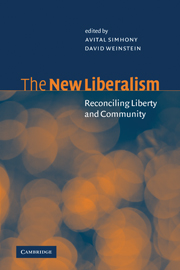Book contents
- Frontmatter
- Contents
- List of contributors
- Acknowledgments
- Introduction: The new liberalism and the liberal–communitarian debate
- 1 Liberal community: an essay in retrieval
- 2 T. H. Green on individual rights and the common good
- 3 T. H. Green's complex common good: between liberalism and communitarianism
- 4 Private property, liberal subjects, and the state
- 5 Neutrality, perfectionism, and the new liberal conception of the state
- 6 Bosanquet's communitarian defense of economic individualism: a lesson in the complexities of political theory
- 7 The new liberalism and the rejection of utilitarianism
- 8 Staunchly modern, non-bourgeois liberalism
- 9 The new liberalism and citizenship
- Select bibliography
- Index
1 - Liberal community: an essay in retrieval
Published online by Cambridge University Press: 06 July 2010
- Frontmatter
- Contents
- List of contributors
- Acknowledgments
- Introduction: The new liberalism and the liberal–communitarian debate
- 1 Liberal community: an essay in retrieval
- 2 T. H. Green on individual rights and the common good
- 3 T. H. Green's complex common good: between liberalism and communitarianism
- 4 Private property, liberal subjects, and the state
- 5 Neutrality, perfectionism, and the new liberal conception of the state
- 6 Bosanquet's communitarian defense of economic individualism: a lesson in the complexities of political theory
- 7 The new liberalism and the rejection of utilitarianism
- 8 Staunchly modern, non-bourgeois liberalism
- 9 The new liberalism and citizenship
- Select bibliography
- Index
Summary
The liberal–communitarian debate, that intellectual companion and topological vade mecum of Anglo-American political philosophers in the 1980s and early 1990s, has left a residue that is still difficult to expunge. At its worst, it has created a new generation of students unable to think about liberalism in terms other than the contrast in which the terms are presented, and a contingent of politicians who have eagerly assimilated communitarianism or anti-communitarianism to their short-list of sound bites. At best, it has encouraged professional philosophers to reengage with issues of social responsibility, respect for individuals, and the quasi-anthropology of human nature. But facile dichotomies, however attractive to the pedagogue and categorizer, are the bane of understanding social life in its complexities; monolithic interpretations assigned to political concepts obfuscate the varied indeterminacy of the meanings they contain; and abstractions from concrete human conduct are a hindrance to the moralist who is also a social reformer, as well as a hindrance to the political theorist who is also an analyst of the actual political thought of a society and its key thinkers.
The purpose of this chapter is hence manifold. It attempts to put recent philosophical discussion in a comparative historical perspective. It endeavors to suggest that other conversations about liberalism existed before the current, ahistorical and asocial, version and that to ignore those conversations is not only to turn a blind eye to a cumulative ideational discourse but to impoverish our comprehension of current issues.
- Type
- Chapter
- Information
- The New LiberalismReconciling Liberty and Community, pp. 26 - 48Publisher: Cambridge University PressPrint publication year: 2001
- 3
- Cited by



